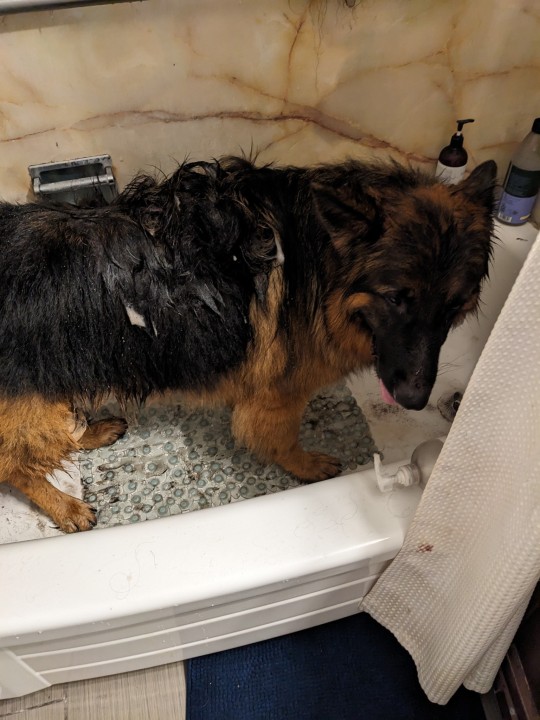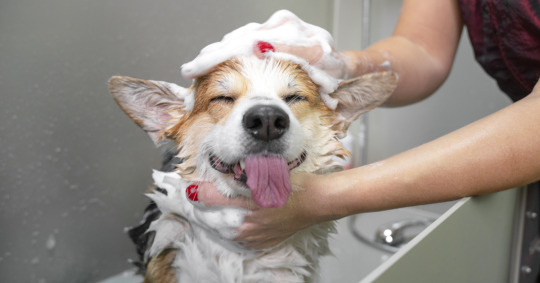#Dog Allergies
Explore tagged Tumblr posts
Text
I don’t know if I ever posted an update about the mysterious bladder issue Mandana was having last year but we did end up figuring it out.
She was having allergic reactions to the water-activated herbicides that our apartment complex uses excessively. So whenever it would rain she would have a skin reaction + swelling and we would give her antihistamines. Turns out antihistamines can cause urine retention. So then she wasn’t peeing and I would take her to the vet for suspected UTI but the tests would always come back negative.
Now that I’m more aware of the issue I try to only use Benadryl when she’s having a really bad reaction. Otherwise, I use a double dose of Claritin which still causes her to have trouble peeing but not as severe.

#belgian malinois#3 years#service dog in training#service dogblr#dogblr#vetblr#dog uti#dog allergies#sick dog
32 notes
·
View notes
Photo










(via Flea Allergy in Dogs: Causes, Symptoms, and Solutions - Doggozila Magazine)
#Dog Allergies#Flea allergies in dogs#Dog health#Dog Diseases#Dog health tips#Dog health care#Dog blog#Dog dad#Dog mom#Dog magazine
4 notes
·
View notes
Text
Does Your Dog Have Seasonal Allergies?

Like people, dogs can be allergic to various materials in the air. These materials are called allergens. And for dogs sensitive to these airborne allergens, they can experience signs of allergies.
Humans with seasonal allergies usually have runny eyes, a runny nose or stuffy nose, a scratchy throat, and other upper respiratory symptoms. But most dogs with seasonal allergies have itchy and irritated skin. Since the symptoms show up in dogs' skin, the condition is called atopic dermatitis or atopy.
What are the symptoms of seasonal allergies in dogs?
The symptoms of seasonal allergies vary depending on your dog and what they are allergic to. Most dogs will show signs of irritation in their skin, but they can have other symptoms.
Twelve common symptoms of seasonal allergies include:
Licking their paws
Rubbing their face
Shedding excessively
Biting their coat or skin
Licking their anal glands
Rubbing their butt against the floor or carpet
Chronic ear infections
Red, waxy, smelly, or inflamed ears
Red, inflamed, or infected skin
Sneezing more than usual
Unusually dark or thick elephant-like skin
Discoloration of the itchy skin
The most commonly affected areas of a dog’s body are their:
Paws
Toes
Ears
Underarms
Groin
Muzzle
Dogs with seasonal allergies generally show symptoms between 1 and 3 years of age. If you notice these signs, make an appointment with your dog’s veterinarian. Early detection and treatment are vital to managing canine allergies.
What triggers seasonal allergies in dogs?
Seasonal allergies are triggered by something your dog is sensitive to in their environment. While many substances can trigger allergies in dogs, the most common allergens are:
Tree pollens, such as cedar, ash, and oak
Weed pollens, like ragweed in humans
Grass pollens
Mold spores
Mildew
Dust mites
Shed skin cells, like pet allergies in humans
Unlike humans who breathe in airborne particles, airborne allergens get into the dog’s skin.
The skin is the first line of defense against foreign substances. If your dog’s skin can’t properly block the allergens, it triggers their immune system.
Once the allergens enter your dog’s body, their overactive immune system becomes inflamed. The inflammation causes itching and scratching, a telltale sign of dog allergies.
When are dogs most likely to get seasonal allergies?
Like humans, dogs experience allergies at different times of the year, depending on what triggers the allergic response. Some dogs have seasonal allergies that flare up once or twice throughout the year. Other dogs have year-round allergies. And like humans, some dogs’ seasonal allergies can develop into a chronic problem, becoming year-round allergies.
Allergies to tree, grass, and weed pollens are usually seasonal. So, you may only notice your dog showing symptoms at certain times of the year.
If your pup is most affected during the spring and summer, allergies to weed, grass, and tree pollens might be to blame. Try wiping your pup’s coat and feet when you come inside. This will wipe off any pollen and allergens trapped in their fur.
If your furry friend suffers year-round, molds, mildew, and house dust mites might be the offenders.
How do you treat seasonal allergies in dogs?
Since most seasonal allergies are environmental, there is no permanent cure. But, there are treatments available to control the symptoms. The best treatment depends on the seasons your dog is affected by allergies, what they are allergic to, and factors such as your dog's age and commitment to the treatment plan.
Treatments for canine seasonal allergies often involve one or more of the following methods.
1. Avoid allergens
The best treatment for seasonal allergies is avoiding allergens when possible. This might not be the perfect solution for your dog though. Pollen and other airborne allergens can travel in the air for miles.
But, there are some things you can do to limit allergen exposure in your home:
Wash your dog’s bedding weekly in hot, soapy water, and dry on a hot dryer cycle to kill dust mites.
Vacuum soft surfaces, such as carpeting and couches, often.
If possible, use hardwood or linoleum flooring and washable area rugs.
Vacuum floors and carpets weekly.
Use a vacuum cleaner with a high-efficiency air (HEPA) filter.
If possible, use air conditioning rather than open windows during pollen season.
Give your dog hard, washable chew toys rather than plush toys.
If plush toys are a favorite, wash them weekly in hot, soapy water.
Use air conditioners on recirculation mode to cut down on humidity.
Use dehumidifiers to prevent mold in bathrooms, kitchens, and other damp spots.
2. Antihistamine treatment
Antihistamine medications block allergy symptoms. Examples of antihistamines used to treat seasonal dog allergies include:
Clemastine (Tavist)
Trimeprazine (Temaril-P, Vanectyl-P)
Astemizole (Hismanal)
These medications are widely used, but they are not as effective as other treatments in providing short- or long-term relief. Though, they may offer some relief when used with other therapies.
3. Anti-inflammatory steroids
Treatment with steroid medications can effectively block the allergic reaction and stop the itch. Your veterinarian may prescribe medications like:
Prednisone
Prednisolone
Dexamethasone
There can be negative side effects associated with steroids. Side effects may be more likely with higher doses or long-term use of these medications.
Some side effects include:
Extreme hunger
Extreme thirst
Weakening of the immune system
Rise in blood sugar
Infections, particularly upper respiratory tract and urinary tract infections
The goal is to use other treatments with steroids to lessen or eliminate the need for steroid medications.
Omega-3 fatty acid supplements can improve the response to steroids in some dogs. In some cases, omega-3 supplements can stop the skin from producing inflammatory chemicals. Supplementing with omega-3s can lower the steroid dose needed to control symptoms.
4. Shampoo therapy
Bathing your dog with a hypoallergenic shampoo can soothe inflamed skin. Bathing and wiping down their coat and skin often also washes out any allergens your dog may pick up.
Ask your vet for recommendations on which shampoo to buy. Some are available over the counter (OTC) while others require a prescription from your veterinarian. Your vet can also tell you how often to bathe your dog. The recommendations may vary by breed and skin type.
5. Allergy shots
Allergy Shots — or allergen-specific immunotherapy (ASIT) — can be very effective for dogs with environmental allergies. Allergy shots focus on retraining your dog's immune system.
This treatment is a good choice for dogs who have not responded well to other therapies. And it tends to work better in younger dogs.
Before beginning this treatment, your dog must be allergy tested by a veterinary dermatologist to find which allergens cause the reaction. Your vet then creates a custom allergy shot for your dog. You or your vet inject your dog with gradually higher doses until you reach a maintenance dose.
Treatment with allergy shots requires a long-term commitment from the owner. Additionally, allergy shots are not a quick fix. Most dogs and pet parents don’t see improvement for 6 months to 1 year.
Is it safe to give a dog Benadryl?
Although Benadryl (diphenhydramine) is not FDA-approved for animal use, it is generally safe to give a dog Benadryl. But, before reaching into your medicine cabinet, talk to your veterinarian about appropriate dosage and possible interactions.
The dosing between humans and animals is very different. Giving your dog too much Benadryl can hurt them, as with many human medications. And there are certain side effects you should watch for.
Common Benadryl side effects that dogs can experience include:
Drowsiness
Dry mouth
Trouble urinating
Salivating more than usual
Fast heart rate
Rapid breathing
If your dog takes any other medication or has another health condition, Benadryl might not be recommended. Make sure to ask your vet first.
When should you see a vet about dog allergy symptoms?
Generally, you should see your vet if your dog shows any signs of allergies, including:
Appearing itchy
Getting repeated ear infections.
Having inflamed, red, or irritated skin
Environmental allergies don’t go away on their own and tend to worsen the longer they are left untreated. The earlier you begin a treatment program, the more likely it is to be successful.
The bottom line
No pet parent likes watching their canine companion suffer. But seasonal allergies don’t just get under our skin. They can get under our dogs’ skin, too! And like humans, dogs can react to seasonal allergens, like plant pollens, molds, mildew, and dust mites.
These allergens enter the dog’s body through the skin. So, while humans have more upper respiratory allergy symptoms, our dogs have more skin inflammation, itching, and scratching.
While there is no cure for seasonal allergies, many treatments are available. And the sooner the problem is addressed, the better the chance of controlling the symptoms. If you suspect your dog may have seasonal allergies, make an appointment with your vet so you can discuss available treatment options.
4 notes
·
View notes
Text





Y'all when I tell you I'm stressed and exhausted from fighting this dog's allergies. He's been tested. I'm waiting on results.
10 notes
·
View notes
Text
So I'm on a quest to find something besides Apoquel for Lancer's allergies. We've had two prescriptions and it works like a charm but I don't love the idea of having him on an expensive immunosuppressant indefinitely, since the symptoms are borderline manageable with medicated baths and such now that the pollen is gone.
I'd love to hear from anyone who's gotten a natural or low-key kind of remedy to work on dermatitis and itchy eyes for a pet. Everything's fair game, except raw diet bc human anxiety reasons - we've tried PetHonesty allergy support, we use Ketohex shampoo from the vet on the irritation, oatmeal and aloe shampoo and spray, I just picked up another bottle of herbal supplement to try, I am looking into CBD oil, etc.+.
We feed Fromm grain-inclusive but I'm up for switching it... though I'd prefer keeping the grains in bc DCM risk for large breeds.

Beast in a Bath wants your advice :D
5 notes
·
View notes
Text
Just imagine... and hear me out... Regulus figuring Sirius out as an animagus because Regulus is allergic to dogs. So all of a sudden he starts reacting to Sirius’ room and Sirius but only some of the time and eventually he puts it together and Sirius is so miffed because his secret is spilt over something he literally could not control.
6 notes
·
View notes
Link
🐾 Discover the Top 7 Most Common Food Allergies in Dogs! 🐾
Is your furry friend scratching, itching, or having tummy troubles? Learn about the most common food allergies in dogs and how to keep your pup happy and healthy. From identifying symptoms to managing and preventing allergies, we've got you covered.
Check out our latest video to ensure your dog stays in tip-top shape! 🐶❤️
📘 Don't miss out on our special guide: "Special Paws, Special Meals: Delicious and Nutritious Recipes for Dogs with Special Needs." Get your copy now: Special Paws, Special Meals
Visit our website for more tips and resources: PoochWell
#dog#dogs#dog health#dog care#dog allergies#dog food#homemade dog food#allergies#food allergies#pet care#pet health#pet parent#dog mom#dog parent
0 notes
Text
Tried and Tested Natural Remedies for Your Dog's Allergies
If your dog is suffering from allergies, you may be looking for natural remedies to help alleviate their symptoms. There are several tried-and-tested options that might provide some relief for your furry family member without the need for harsh medications. There’s a list of options that we won’t get into in this article, but for now, check out what we’ve put together as natural itch relief for…

View On WordPress
0 notes
Text
I needed guidance, so I went to my friend’s house. He was a Hawaiian elder, a chief or something, so I knew he’d be able to help me with my problems.
While I was there telling him what was bothering me, this little gray puppy ran up and hopped in my lap, started licking me all over. He told me the dog just showed up one day, so he’d been feeding it, but he can’t touch it since he’s allergic to dogs. It was so cute, this little gray thing with dark gray eyebrows and a dark gray moustache.
The elder had to get up to get his allergy medication, and on his way to the bathroom he told me I should take my boat and sail, go see the world. I was looking at the art on his walls and decided I’d take the dog with me, as a companion, so I named him Eyebrows ‘cause of his dark eyebrows.
7K notes
·
View notes
Text

I’m so glad we figured out that the water activated herbicides were the trigger. The chemicals were supposed to be dissolved by now but she’s still having reactions every time it rains. Now that I know to be hyper vigilant when it rains, I’ve been able to stop multiple reactions that normally would have sent her to the vet with blisters around her eyes. She’s still swollen all over her body but we just got her LDN Rx and I’m really hoping it might help calm her immune system.
24 notes
·
View notes
Photo








(via Dog Allergies: Can Dogs Be Allergic to Cats? - DOGGOZILA MAGAZINE)
#Dog allergies#Allergies in dogs#Dogs allergic to cats#Cats allergic to dogs#Dogs and cats#Dog health#Veterinary tips
3 notes
·
View notes
Text
How To Help Your Dog With Fall Allergies

Ah, fall is in the air, and along with that air comes watery eyes, sneezing, runny nose, and, most commonly of all, skin problems for your best friend! Dog fall allergies can be as big of a problem for your dog as they can be for you.
Dog allergies can manifest in the form of itchy skin, red eyes, hair loss, or even general itchiness. So what’s causing the problem, and what can you do as a loving pet parent to help?
What Allergens Cause Dog Allergies?

Allergens are basically foreign substances that your pooch can inhale, ingest, or just come into contact with, and when he does, it’s possible for his immune system to overreact.
While the fall season is not associated as much as spring with allergic reactions, there are still several plants, like ragweed and sagebrush, that release pollen in the fall. Fall winds can then spread those substances far and wide.
Mold is also a culprit in fall allergies because increased rain and piles of decaying leaves are great environments for growing mold. Additionally, your good buddy may be more exposed to dust mites in the fall season when your heating system turns on and spreads them throughout the house.
Your pup may also show signs of a flea allergy in the fall since they thrive on the increased moisture in the air.
Your dog’s environmental allergies can then result in itchiness, redness, hives, or swelling. He usually responds by licking or chewing on the affected areas, and that can result in secondary skin infections, which then create even more itching. This allergic reaction on your dog’s skin is known as atopic dermatitis or atopy.
It’s a real catch-22, so what should you look for during allergy season?
Signs of Dog Fall Allergies

Signs of allergies in your dog include:
sneezing
watery eyes
runny nose
skin rashes
hair loss
waxy ear discharge
red paws
odor
excessive scratching
Just like with humans, your dog may suffer from sneezing, watery eyes, and a runny nose. But you might also see him develop rashes and generally irritated skin.
He might also experience hair loss, a waxy discharge from his ears, and red, discolored, smelly feet. Flea allergies can also cause secondary ear infections and other problems like an aural hematoma.
Aural hematomas occur when your dog shakes his head because of an irritated ear. He can shake it so vigorously that the skin of the ear separates from the underlying cartilage. That creates a space where blood can pool. That’s an aural hematoma.
How Can You Be Sure It’s Seasonal Allergies?

While environmental allergies are common in dogs, other problems can cause similar symptoms. It’s vital to determine the cause of your dog’s itchy skin, ear infections, or other symptoms in order to choose the best treatment.
While runny eyes might be due to seasonal allergies, it could also be an eye infection or injury that causes that. Other types of problems include things like dog food allergies and allergic skin lesions resulting from a bacterial infection, among others.
Respiratory symptoms could be seasonal allergies, but it could also be something like kennel cough.
Though environmental allergies are common, there are many other health conditions that cause similar symptoms. It’s important to know which one is causing your dog’s itchy skin or ear infections.
That’s why you’ll want to consult a veterinarian when you notice allergy symptoms in your pooch. They can perform diagnostic tests to determine the exact cause. Since those symptoms can be very uncomfortable and result in more problems, the sooner you visit your DVM, the better.
How Seasonal Allergies Are Diagnosed
There are a number of diagnostic tests your veterinarian might perform, but they usually start with a general physical exam. Your vet will ask about possible allergen exposure, and then they may follow up with some simple skin tests.
For example, they might do a skin scraping and look at the material microscopically to see if there are any skin mites or other identifiable causes. If your pup’s symptoms involve problems with his ears, they will look for evidence of an ear infection.
If your vet thinks that the symptoms are due to something else, they may recommend other types of diagnostic tests. If they suspect food allergies, they may also conduct a food trial, which often involves stopping all foods your dog is eating and instead feeding something hypoallergenic like lamb and rice. Then you reintroduce his old food slowly until the symptoms reappear. That will allow them to identify the specific allergen.
If allergies are determined to be the cause, and your dog has a particularly severe case, they might also recommend allergy testing to determine the specific sensitivity. Once they know the environmental allergens are causing your pup’s symptoms, they can recommend an appropriate treatment.
How are Seasonal Allergies Treated?

You can’t cure allergies, but you can manage the symptoms so that your pooch stays comfortable. There are some over-the-counter medications, like antihistamines (think Benadryl, for example), that can manage those fall allergy symptoms.
Of course, you want to be careful about giving any over-the-counter drugs until you’ve spoken with your vet. Just because you can take a drug like that doesn’t mean it’s safe for your pet.
Your veterinarian might also recommend using a medicated shampoo to help relieve skin irritation or itchiness. For many dogs, those kinds of treatments will be enough to relieve the symptoms, and if fall allergies are to blame, you shouldn’t have to use them year-round.
Dogs with more severe symptoms, however, might need something stronger. In these cases, your dog might need something like a steroidal medication to lessen the strong reaction your dog’s body is having to the allergen.
There are also allergy shots available to help desensitize your pup to the allergen. For these, it will be important to conduct skin testing to determine the specific cause of the reaction.
Of course, it’s also important to treat your pup for any secondary skin or ear infections that develop as a result of the symptoms.
What You Can Do at Home

There are a couple of things you can do at home to help prevent allergic reactions or at least lessen the severity of the reaction. You can wipe your dog’s paws and belly off with a clean, wet cloth after you’ve been on a walk, for example.
It’s also a good idea to bathe your dog once a week. Use a gentle dog shampoo, and pay special attention to areas that might come into contact with plants shedding pollen.
Wash your dog’s bed and any linens he comes into contact with regularly so you can limit his exposure to dust mites. Feeding high-quality dog food and getting him checked regularly for parasites are also important for reducing allergy symptoms.
Final Thoughts on Dog Fall Allergies
While it might be a lovely time of the year, fall can also bring different allergy symptoms that can make you and your pooch really uncomfortable. Take the steps you can to keep your home free of allergens, and see your vet if symptoms develop. You’ll feel as relieved as your pooch when the itching stops!
11 notes
·
View notes
Text
Using Natural Remedies to Treat Your Dog's Allergies
As pet owners, we want our furry companions to be happy and healthy. However, just like humans, dogs can suffer from allergies that can cause discomfort and distress. Allergies in dogs can manifest in various ways, such as itchy skin, sneezing, and digestive issues. While there are many pharmaceutical options available to treat these allergies, some pet owners prefer to use natural remedies for their beloved canines. Natural remedies have gained popularity in recent years, as they are often seen as a safer and more holistic approach to treating health issues. In this article, we will delve into the world of natural remedies and explore how they can be used to effectively treat your dog's allergies. From herbs and essential oils to dietary changes and supplements, we will discuss the different options available and their potential benefits. We will also address the importance of consulting with a veterinarian before trying any natural remedies on your dog, as well as potential risks and limitations. So, if you are looking for a more natural and gentle way to alleviate your dog's allergies, keep reading to discover the wonders of using natural remedies for our canine companions.
1. Introduction to natural allergy remedies
With the rise of allergies in both humans and pets, many people are seeking natural alternatives to traditional medication. When it comes to treating your dog's allergies, there are a variety of natural remedies that can provide relief and improve their overall health. However, it's crucial to approach these remedies with caution and to always consult with your veterinarian before starting any new treatment plan. In this article, we will explore some of the most commonly used natural remedies for dog allergies and their potential benefits and risks. By understanding the options available, you can make an informed decision about what is best for your furry friend's well-being.
2. Identifying common dog allergies
While there are many potential natural remedies for dog allergies, it is important to first identify the specific allergens that are causing your dog's symptoms. Common allergens for dogs include pollen, dust, mold, and certain foods. Your veterinarian can conduct allergy tests to determine which substances your dog is reacting to and create a treatment plan tailored to their needs. It is also important to note that some natural remedies, such as essential oils, may still cause allergic reactions in dogs and should be used with caution. Always consult your veterinarian before trying any new treatment, including natural remedies, for your dog's allergies.
3. The benefits of natural remedies
In addition to consulting with a veterinarian and identifying specific allergens, using natural remedies to treat your dog's allergies can provide numerous benefits. These remedies are often gentle and have minimal side effects, making them a safer option for your furry friend compared to traditional medications. They also often target the root cause of the allergy rather than just masking symptoms, resulting in more long-term relief. Furthermore, natural remedies can often be more cost-effective than prescription medications and can be easily integrated into your dog's daily routine. With the right approach and guidance from a trusted veterinarian, natural remedies can be a valuable tool in managing your dog's allergies.
4. Incorporating omega-3 fatty acids
One natural remedy that has shown promise for treating dog allergies is incorporating omega-3 fatty acids into their diet. These fatty acids have anti-inflammatory properties that can help reduce the severity of allergic reactions in dogs. They can also improve the overall health of your dog's skin and coat, which may be affected by allergies. Sources of omega-3 fatty acids include fish oil, flaxseed, and chia seeds. However, it is important to consult with a vet before adding any supplements to your dog's diet to ensure proper dosing and monitoring of potential side effects.
5. Soothe your dog's itchy skin.
Additionally, there are several natural remedies that can help soothe your dog's itchy skin caused by allergies. One option is to give your dog a bath with a gentle, hypoallergenic shampoo. This can help remove any allergens from their fur and provide relief from itching. You can also try using a natural, topical solution such as oatmeal or aloe vera to soothe the irritated skin. Adding a teaspoon of organic apple cider vinegar to your dog's water bowl can also help balance their pH levels and reduce allergic reactions. However, it is important to consult with your veterinarian before trying any new remedies, as they can recommend the best course of action for your dog's specific needs. With proper care and attention, your dog's itchy skin caused by allergies can be effectively managed using natural remedies.
6. herbal supplements for allergy relief.
When it comes to finding relief for your dog's allergies, herbal supplements may also be worth considering. These supplements are derived from plants and can be a natural and holistic approach to managing your dog's symptoms. Some popular herbal supplements for allergy relief include nettle, butterbur, and quercetin. These supplements are believed to have anti-inflammatory properties and can support your dog's immune system. As always, it is important to consult with a veterinarian before adding any new supplements to your dog's diet to ensure they are safe and effective for your specific dog's needs.
7. Using apple cider vinegar
Another natural remedy that has gained popularity in recent years is apple cider vinegar. While there is limited scientific evidence to support its use for allergies in dogs, many pet owners swear by its effectiveness. Apple cider vinegar is believed to have antibacterial and antifungal properties, which can help with skin allergies and infections. It can also be added to a dog's food to aid in digestion and boost the immune system. However, it is important to dilute it with water before using it on a dog's skin, as it can be too harsh in its pure form. As with any natural remedy, it is best to consult with a veterinarian before using apple cider vinegar on your dog.
8. The power of local honey
Another natural remedy that has gained attention for its potential allergy-fighting properties is local honey. The idea behind this remedy is that consuming honey made from local pollen can desensitize a dog's immune system to the allergens in the environment. While there is no scientific evidence to support this claim, many dog owners have reported positive results after giving their dogs small amounts of local honey regularly. However, it is important to note that honey should not be given to dogs with diabetes or other health conditions that require a restricted diet. As always, consulting with a veterinarian before trying any new remedies is recommended.
9. Managing allergies with probiotics
Another natural remedy that has gained popularity for managing allergies in dogs is probiotics. These live microorganisms are known to promote a healthy balance of bacteria in the gut, which can improve overall immune function. Studies have shown that probiotics can also reduce the severity of allergic reactions in dogs, making them a potential solution for those with allergies. However, it is important to consult with a veterinarian before giving probiotics to your dog, as the proper dosage and type of probiotic may vary depending on their individual needs. Additionally, probiotics should be used in conjunction with other allergy management methods, such as avoiding trigger foods and keeping the environment clean, for the best results.
10. Consult a veterinarian for guidance.
Seeking guidance from a veterinarian is crucial when it comes to using natural remedies to treat your dog's allergies. While probiotics may be beneficial for some dogs, they may not be suitable for all and could potentially worsen your dog's condition if not used correctly. A veterinarian can provide personalized recommendations based on your dog's specific needs and health history. They can also help monitor your dog's progress and make adjustments to the treatment plan as needed. Consulting with a professional can ensure the safe and effective use of natural remedies in managing your dog's allergies.
In conclusion, while natural remedies can be a helpful and holistic approach to treating your dog's allergies, it is important to always consult with a veterinarian before making any changes to your pet's diet or medication. Each dog's allergies may be different and require a specific treatment plan. By working with a professional and considering natural remedies as a complementary approach, you can provide your furry friend with the best care possible for their allergies. Remember to always monitor your dog's reactions and consult with your vet for any concerns. With the right care and attention, your dog can find relief from their allergies and live a happy and healthy life.
FAQ
1. What are some natural remedies that can help alleviate my dog's allergies?
Some natural remedies that may help alleviate a dog's allergies include regularly bathing them with hypoallergenic shampoo, using a diluted apple cider vinegar rinse to soothe itchy skin, providing a balanced and nutritious diet, adding omega-3 fatty acids to their food, using chamomile or green tea compresses to reduce inflammation, and incorporating natural antihistamines such as quercetin or nettle into their diet. However, it is important to consult with a veterinarian before trying any natural remedies to ensure they are safe and appropriate for your dog's specific allergies and health conditions.
2. Are there any specific herbs or supplements that are effective in treating dog allergies?
Yes, there are several herbs and supplements that are believed to be effective in treating dog allergies. Some commonly recommended options include nettle leaf, licorice root, quercetin, omega-3 fatty acids, and probiotics. These natural remedies are thought to help reduce inflammation, strengthen the immune system, and alleviate symptoms such as itching and irritation. However, it is important to consult with a veterinarian before introducing any new herbs or supplements to your dog's diet, as individual allergies and sensitivities can vary. Additionally, these remedies should not be used as a substitute for proper diagnosis and treatment by a professional.
3. How can I determine if my dog's allergies are caused by food or environmental factors, and what natural remedies can be used for each?
To determine if your dog's allergies are caused by food or environmental factors, you can start by keeping a detailed record of their symptoms and potential triggers. If the symptoms are consistent throughout the year, it's likely an environmental allergy, while if they occur after eating certain foods, it could be a food allergy. To confirm the cause, you can work with your veterinarian to perform an elimination diet or allergy testing. For environmental allergies, natural remedies such as regular bathing, hypoallergenic bedding, and minimizing exposure to triggers can help. For food allergies, switching to a limited-ingredient or hypoallergenic diet or introducing natural anti-inflammatory supplements like fish oil can provide relief.
4. Are there any potential risks or side effects associated with using natural remedies to treat dog allergies?
While natural remedies for dog allergies may seem safer than conventional treatments, there are still potential risks and side effects to consider. Some natural remedies, such as certain herbs or essential oils, can be toxic to dogs if ingested or applied incorrectly. Additionally, the effectiveness of natural remedies may vary, and they may not provide sufficient relief for severe allergies. It is important to consult with a veterinarian before using any natural remedies to ensure they are safe and appropriate for your dog's specific condition.
5. Can natural remedies completely replace traditional medication for treating dog allergies, or should they be used in conjunction with veterinary care?
Natural remedies can provide some relief for dog allergies, but they should not replace traditional medication or veterinary care. While natural remedies like dietary changes, supplements, and herbal treatments may help alleviate symptoms, they may not address the underlying cause or provide sufficient relief for more severe cases. Veterinary care is crucial to accurately diagnose and manage allergies, prescribe appropriate medications, and monitor the dog's overall health. A combination of natural remedies and veterinary care can provide the best outcome for treating dog allergies and ensuring the well-being of the animal.
#dog skin allergies home remedies#how to treat dog allergies#dog allergies#home remedies#allergies in dogs#natural remedies#home remedies for dog allergies#allergies in dogs natural remedies#treat seasonal dog allergies naturally#natural remedies for dog allergies#allergies in dogs eyes how to treat#dog skin allergies#how to get rid of pet allergies#how to treat seasonal dog allergies naturally#dog allergy remedies
0 notes
Link
🐾🌞 Is Your Pup Itchy This Summer? 🐶✨ Discover top remedies for summertime allergies and keep your furry friend comfortable and happy!
#dog#dogs#dog health#dog care#dog allergies#dog fur#dog coat#summer dog#summer days#summertime#pet care#pet health
0 notes
Text
Swift: When you realize you've turned your dog into a canine version of yourself - InForum
New Post has been published on https://petn.ws/fbaTa
Swift: When you realize you've turned your dog into a canine version of yourself - InForum

I used to think that the o ld adage about dog owners getting dogs who look like them was a bunch of hogwash. Or maybe dogwash. After all, my last dog was a delicate, fine-boned Pom-doodle mix with tiny feet, an observant demeanor, and a gorgeous coat of long, silky black hair. She rarely tipped […]
See full article at https://petn.ws/fbaTa #DogNews #AnxiousDogs, #DogAllergies, #DogObesity, #DogOwners, #DogOwnership, #DogWeightProblems, #Dogs, #DogsAndOwnersWhoLookAlike, #DogsWhoLick, #LookalikeDogsAndOwners
#anxious dogs#dog allergies#Dog obesity#Dog Owners#Dog ownership#Dog weight problems#dogs#Dogs and owners who look alike#Dogs who lick#Lookalike dogs and owners#Dog News
0 notes